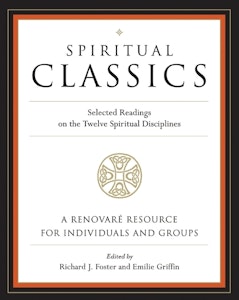Introductory Note:
Best known for his books The Pursuit of God and The Knowledge of the Holy, A.W. Tozer (1897-1963) served for many years as a pastor with the Christian and Missionary Alliance. A man of intense prayer, Tozer was something of a twentieth-century prophet, calling the church back to simplicity and godliness. Today’s passage from The Pursuit of God is, for me, a much-needed summons to the way of surrender and renunciation.
 Excerpt from Spiritual Classics
Excerpt from Spiritual Classics
Blessed are the poor in spirit: for theirs is the kingdom of heaven. (Matt. 5:3)
Before the Lord God made man upon the earth He first prepared for him a world of useful and pleasant things for his sustenance and delight. In the Genesis account of the creation these are called simply “things.” They were made for man’s use, but they were meant always to be external to the man and subservient to him. In the deep heart of the man was a shrine where none but God was worthy to come. Within him was God; without, a thousand gifts which God had showered upon him.
But sin has introduced complications and has made those very gifts of God a potential source of ruin to the soul.
Our woes began when God was forced out of His central shrine and things were allowed to enter. Within the human heart things have taken over. Men have now by nature no peace within their hearts, for God is crowned there no longer, but there in the moral dusk stubborn and aggressive usurpers fight among themselves for first place on the throne.
This is not a mere metaphor, but an accurate analysis of our real spiritual trouble.…
The tyranny of things
Our Lord referred to this tyranny of things when He said to His disciples, “If any man will come after me, let him deny himself, and take up his cross, and follow me. For whosoever will save his life shall lose it: and whosoever shall lose his life for my sake shall find it” (Matt. 16:24 – 25).
Breaking this truth into fragments for our better understanding, it would seem that there is within each of us an enemy which we tolerate at our peril. Jesus called it “life” and “self,” or as we would say, the self-life. Its chief characteristic is its possessiveness: the words gain and profit suggest this. To allow this enemy to live is, in the end, to lose everything. To repudiate it and give up all for Christ’s sake is to lose nothing at last, but to preserve everything unto life eternal. And possibly also a hint is given here as to the only effective way to destroy this foe: it is by the cross. “Let him take up his cross and follow me.” …
Uncleansed love
As is frequently true, this New Testament principle of spiritual life finds its best illustration in the Old Testament. In the story of Abraham and Isaac we have a dramatic picture of the surrendered life as well as an excellent commentary on the first Beatitude.
Abraham was old when Isaac was born, old enough indeed to have been his grandfather, and the child became at once the delight and idol of his heart. From the moment he first stooped to take the tiny form awkwardly in his arms, he was an eager love slave of his son. God went out of His way to comment on the strength of this affection. And it is not hard to understand. The baby represented everything sacred to his fathers heart: the promises of God, the covenants, the hopes of the years and the long messianic dream. As he watched him grow from babyhood to young manhood, the heart of the old man was knit closer and closer with the life of his son, till at last the relationship bordered upon the perilous. It was then that God stepped in to save both father and son from the consequences of an uncleansed love.
“Take now thy son,” said God to Abraham, “thine only son Isaac, whom thou lovest, and get thee into the land of Moriah; and offer him there for a burnt-offering upon one of the mountains which I will tell thee of (Gen. 22:2). The sacred writer spares us a close-up of the agony that night on the slopes near Beersheba when the aged man had it out with his God, but respectful imagination may view in awe the bent form wrestling convulsively alone under the stars. Possibly not again until One greater than Abraham wrestled in the Garden of Gethsemane did such mortal pain visit a human soul. If only the man himself might have been allowed to die. That would have been a thousand times easier, for he was old now, and to die would have been no great ordeal for one who had walked so long with God. Besides, it would have been a last, sweet pleasure to let his dimming vision rest upon the figure of his stalwart son who would live to carry on the Abrahamic line and fulfill in himself the promises of God made long before in Ur of the Chaldees.
Obedient love
How should he slay the lad! Even if he could get the consent of his wounded and protesting heart, how could he reconcile the act with the promise, “In Isaac shall thy seed be called”? This was Abraham’s trial by fire, and he did not fail in the crucible. While the stars still shone like sharp white points above the tent where the sleeping Isaac lay, and long before the gray dawn had begun to lighten the cast, the old saint had made up his mind. He would offer his son as God had directed him to do, and then trust God to raise him from the dead. This, says the writer to the Hebrews, was the solution his aching heart found sometime in the dark night, and he rose “early in the morning” to carry out the plan. It is beautiful to see that, while he erred as to God’s method, he had correctly sensed the secret of His great heart. And the solution accords well with the New Testament Scripture “Whosoever will lose for my sake shall find.”
God let the suffering old man go through with it up to the point where He knew there would be no retreat, and then forbade him to lay a hand upon the boy. To the wondering patriarch He now says in effect, “It’s all right, Abraham. I never intended that you should actually slay the lad. I only wanted to remove him from the temple of your heart that I might reign unchallenged there. I wanted to correct the perversion that existed in your love. Now you may have the boy, sound and well, take him and go back to your tent. Now I know that thou fearest God, seeing that thou hast not withheld thy son, thine only son, from me.
Then heaven opened and a voice was heard saying to him, “By myself have I sworn, saith the Lord, for because thou hast done this thing, and hast not withheld thy son, thine only son: that in blessing I will bless thee, and in multiplying I will multiply thy seed as the stars of the heaven, and as the sand which is upon the seashore; and thy seed shall possess the gate of his enemies; and in thy seed shall all the nations of the earth be blessed; because thou hast obeyed my voice” (Gen. 22:16 – 18).
Surrendered love
The old man of God lifted his head to respond to the Voice, and stood there on the mount strong and pure and grand, a man marked out by the Lord for special treatment, a friend and favorite of the Most High. Now he was a man wholly surrendered, a man utterly obedient, a man who possessed nothing. He had concentrated his all in the person of his dear son, and God had taken it from him. God could have begun out on the margin of Abraham’s life and worked inward to the center. He chose rather to cut quickly to the heart and have it over in one sharp act of separation. In dealing thus, He practiced an economy of means and time. It hurt cruelly, but it was effective.
I have said that Abraham possessed nothing. Yet was not this poor man rich? Everything he had owned before was his still to enjoy: sheep, camels, herds, and goods of every sort. He had also his wife and his friends, and best of all he had his son Isaac safe by his side. He had everything, but he possessed nothing. There is the spiritual secret. There is the sweet theology of the heart which can be learned only in the school of renunciation. The books on systematic theology overlook this, but the wise will understand.
After that bitter and blessed experience I think the words my and mine never again had the same meaning for Abraham. The sense of possession which they connote was gone from his heart. Things had been cast out forever. They had now become external to the man. His inner heart was free from them. The world said, “Abraham is rich,” but the aged patriarch only smiled. He could not explain it, but he knew that he owned nothing, that his real treasures were inward and eternal—
The way of renunciation
If we would indeed know God in growing intimacy, we must go this way of renunciation. And if we are set upon the pursuit of God, He will sooner or later bring us to this test. Abraham’s testing was, at the time, not known to him as such, yet if he had taken some course other than the one he did, the whole history of the Old Testament would have been different. God would have found His man, no doubt, but the loss to Abraham would have been tragic beyond the telling. So we will be brought one by one to the testing place, and we may never know when we are there. At that testing place there will be no dozen possible choices for us — just one and an alternative — but our whole future will be conditioned by the choice we make.
Father, I want to know Thee, but my cowardly heart fears to give up its toys. I cannot part with them without inward bleeding, and I do not try to hide from Thee the terror of the parting. I come trembling, but I do come. Please root from my heart all those things which I have cherished so long and which have become a very part of my living self, so that Thou mayest enter and dwell there without a rival. Then shalt Thou make the place of Thy feet glorious. Then shall my heart have no need of the sun to shine in it, for Thyself wilt be the light of it, and there shall be no night there. In Jesus’ name, Amen.
Excerpt taken from Spiritual Classics: Selected Readings on the Twelve Spiritual Disciplines, “The Blessedness of Possessing Nothing” (Richard Foster and Emilie Griffin, Editors. Harpercollins, 2000.)


